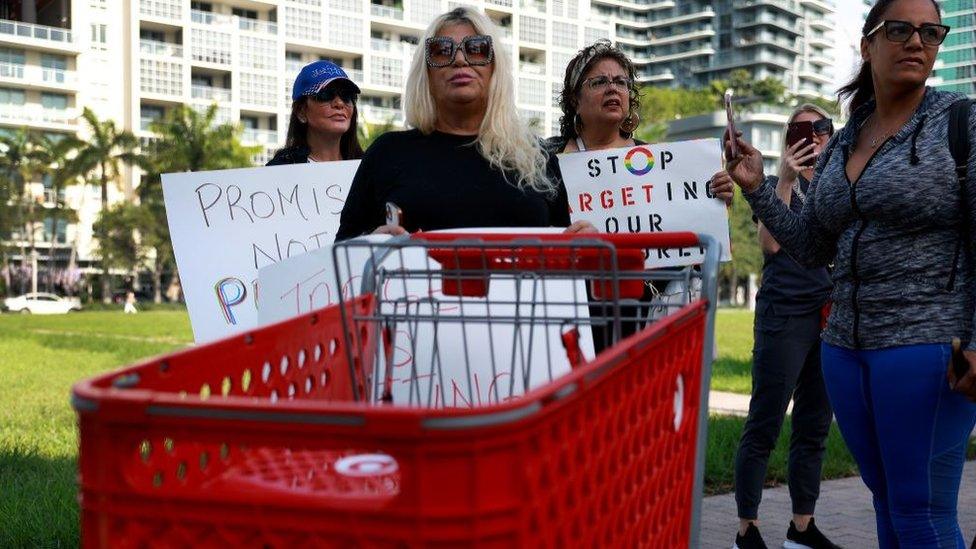Target sales suffer after Pride month backlash
- Published

People protest the collection offered by Target for Pride Month, which it has done for the past 10 years
US retail giant Target saw sales fall in-store and online for the first time in years after a backlash over its Pride Month offering.
Sales dropped 5% in the April to June period compared with the same time last year - its first fall in six years.
The decline followed controversy over some of the firm's LGBTQ Pride merchandise.
It later removed items from some stores over concerns about staff safety.
Target's chief executive Brian Cornell said the decline in sales also reflected the fact shoppers budgets' are being squeezed as the cost of living remains high.
The firm said the impact of those forces was difficult to separate from other issues, such as the calls for a boycott over its Pride month range.
It saw damage to in-store displays and the clothing merchandise, which included a wide selection of items, including t-shirts decorated with rainbows, "gender fluid" mugs and children's books titled "Pride 1,2,3" and "I'm not a girl".
It ultimately removed certain items from the 2,000-piece collection. A number were from a collaboration with transgender designer Erik Carnell's Abprallen label, which faced criticism for items, sold elsewhere, featuring images of pentagrams and horned skulls.
The firm's decision to remove the items, which it made citing employee safety, prompted further outcry from Target customers who celebrate Pride.
Speaking as the firm provided investors with a quarterly update, Mr Cornell said the firm planned to approach future partnerships with caution, while still celebrating "heritage moments".
"As we navigate an ever-changing operating and social environment, we are applying what we learned," Mr Cornell said.
Mr Cornell said Target had seen sales start to pick up again in July, after the sharp drop in June.
But executives forecast weaker performance than previously anticipated for the rest of the year, in part because of concerns about the impact on buyers as a pandemic-era halt to student loan payments finally expires.
Target is the latest US company to face costs as LGBTQ issues increasingly become a political flashpoint. Disney and Bud Light are among the other brands who have faced similar customer boycotts and backlash.
Its report also offered a somewhat gloomy perspective on the health of the American consumer, whose robust spending until now has been credited with helping the world's largest economy defy predictions of a downturn.
Target said buyers were cutting back on items such as clothing and home decor, as rising prices force people to direct more of their monthly budgets to staples such as groceries.
The report's weaker than expected sales contrasted with other recent indicators which showed resilient consumer spending.
A day earlier, the Commerce Department reported that retail sales rose 0.7% from June to July, greater than expected.
Those figures were boosted by a jump in online sales, which coincided with Amazon's annual Prime Day sales event.
Despite the sales fall, Target shares rose more than 6% in early trade, reflecting stronger profits than investors had expected.
Related topics
- Published24 May 2023